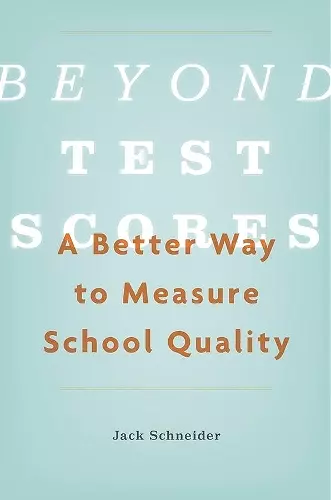Beyond Test Scores
A Better Way to Measure School Quality
Format:Hardback
Publisher:Harvard University Press
Published:31st Aug '17
Currently unavailable, and unfortunately no date known when it will be back

When it comes to sizing up America’s public schools, test scores are the go-to metric of state policy makers and anxious parents looking to place their children in the “best” schools. Yet ample research indicates that standardized tests are a poor way to measure a school’s performance. It is time—indeed past time—to rethink this system, Jack Schneider says.
Beyond Test Scores reframes current debates over school quality by offering new approaches to educational data that can push us past our unproductive fixation on test scores. Using the highly diverse urban school district of Somerville, Massachusetts, as a case study, Schneider and his research team developed a new framework to more fairly and comprehensively assess educational effectiveness. And by adopting a wide range of measures aligned with that framework, they were able to more accurately capture a broader array of school strengths and weaknesses. Their new data not only provided parents, educators, and administrators with a clearer picture of school performance, but also challenged misconceptions about what makes a good school.
With better data, Schneider shows, stakeholders at the federal, state, and local levels can undo the damage of present accountability systems and build greater capacity in our schools. Policy makers, administrators, and school leaders can better identify where assistance is needed. Educators can engage in more evidence-based decision making. And parents can make better-informed choices for their children. Perhaps most importantly, better data can facilitate communication among all these groups, allowing them to take collective action toward shared, concrete goals.
In the K–12 arena, I recommend Jack Schneider’s Beyond Test Scores: A Better Way to Measure School Quality for an approach that gets us past the testing charade and reintroduces some of the values we used to associate with ‘good’ schools. -- John Warner * Inside Higher Ed *
Everyone cares about ‘good’ schools but, as Schneider makes painfully clear in this well-written book, almost no one agrees on what constitutes a ‘good’ school. By broadening the story to talk about what we mean when we discuss school quality, he makes a critical contribution to policy, discourse, and the public good. This is a great book about an important subject that gets at the heart of American inequality. -- Tressie McMillan Cottom, author of Lower Ed
In this engaging, provocative, and at times inspiring book, Jack Schneider not only asks how we can go beyond standard measures of scholastic achievement—he details an approach that is at once original and practical. -- Howard Gardner, author of The App Generation
A clear-eyed, thoughtful step forward in an endeavor everyone should care about: finding out more about how our schools are doing. -- Anya Kamenetz, author of The Test
In this thoughtful and thorough account, Schneider writes about issues that are critical to the future of education and our efforts to ensure that all students have access to good schooling. For those who are ready to move beyond the polarized debates over standardized testing, this book will be enlightening and a breath of fresh air. -- Pedro Noguera, author of Schooling for Resilience
In this important book, Schneider asks us to reconsider the purpose of schools and how we evaluate them. He reminds us that public schools are a public good, and that their original purpose was to foster the development of good citizens. -- Diane Ravitch, author of Reign of Error
By rooting the discussion in what we value, [Schneider] creates a true framework for making informed choices, challenging the ‘failing schools’ narrative by putting test scores in their proper, limited place. -- John Warner * Chicago Tribune *
ISBN: 9780674976399
Dimensions: unknown
Weight: unknown
336 pages